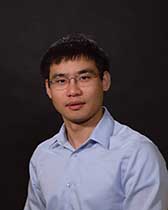Tianlong Zu
Assistant Professor of Instruction - Director of Introductory Physics Labs
PhD, Purdue University, 2017

- tianlong.zu@northwestern.edu
- 847-491-8639
- Tech F275
My research focuses on enhancing physics education at the college level by exploring innovative teaching strategies. Currently, I am developing and testing approaches that combine two established pedagogical practices—retrieval practice and scientific argumentation—to improve problem-solving skills in introductory calculus-based physics courses. Additionally, I am interested in creating mixed reality learning modules designed to deepen conceptual understanding and enhance problem-solving abilities among university physics students.
Selected Publications
- Magana, A. J., Hwang, J., Feng, S., Rebello, S., Zu, T., & Kao, D. (2022). Emotional and cognitive effects of learning with computer simulations and computer videogames. Journal of Computer Assisted Learning, 38(3), 875-891.
- Zu, T.,Munsell, J., & Rebello, N. S. (2021). Subjective measure of cognitive load depends on participants’ content knowledge level. Frontiers in Education, 6, 56.
- Zu, T.,Hutson, J., Loschky, L.C., & Rebello, N.S. (2020). Using eye movements to measure intrinsic, extraneous, and germane load in a multimedia learning environment. Journal of Educational Psychology, 112(7), 1338–1352.
- Zu, T.,Munsell, J., & Rebello, N. S. (2019). Comparing retrieval-based practice and peer instruction in physics learning. Physical Review Physics Education Research, 15(1), 010105.
- Rebello, N., Nguyen, M., Wang, Y., Zu, T.,Hutson, J., & Loschky, L. (2018). Machine Learning Predicts Responses to Conceptual Questions Using Eye Movements. Proceedings of Physics Education Research Conference, Washington, DC.
